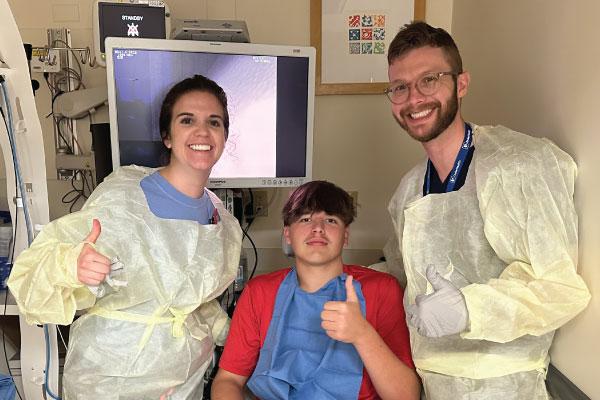
UPDATE 11/29/24: Since the program started, 26 cases have been completed and 4 patients returned for their 2nd procedure.
Transnasal Endoscopy (TNE) is now available at Duke Children's, the first hospital in North and South Carolina to offer this service. TNE is a relatively new procedure that allows a child's gastroenterologist to evaluate the esophagus, stomach, and duodenum; perform biopsies; and obtain good-quality images without sedation.
How It Works.
Rather than pass an endoscope through the mouth to reach the upper gastrointestinal tract, a camera, about the size of a thick noodle, is passed through the nose, then down to the GI tract. Children can eat until four hours before the procedure and return to activities the same day.
Faster Procedure. Less Downtime.
The sedation-free TNE takes approximately the same amount of time to complete as an EGD under general anesthesia. However, patients who undergo sedation-free TNE generally spend less time in the hospital (~60-90 minutes) compared to patients who undergo an EGD under general anesthesia (~120-150 minutes). "Because TNE is offered without anesthesia, patients and their parents can return to normal activities immediately following the procedure. That means returning to school / work, participating in extra-curricular activities, and driving for our older patients," stated John Lyles, MD, assistant professor of pediatrics, in the division of gastroenterology, hepatology and nutrition at Duke.
What Is It Best For?
TNE is best for the initial evaluation of esophageal symptoms (heartburn, difficulty swallowing) and the follow-up of known diagnoses such as gastroesophageal reflux disease, eosinophilic esophagitis, and esophageal varices. The stomach and the first part of the small intestine (duodenum) can also be evaluated during this study. Therefore, TNE can help diagnose peptic ulcer disease, Helicobacter pylori infection, and celiac disease.